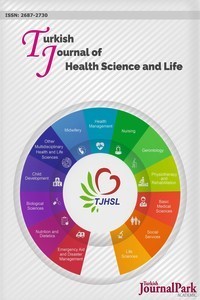Did teachers' digital literacy levels affect distance education during the covid-19 pandemic in Türkiye?
Did teachers' digital literacy levels affect distance education during the covid-19 pandemic in Türkiye?
Distance education, digital literacy, teacher, COVID-19 pandemic,
___
- 1. Oxford Languages and Google - Turkish | Oxford Languages [Internet]. [cited 2022 May 9]. Available from: https://languages.oup.com/google-dictionary-tr/.
- 2. Ried LD. A Distance Education Course in Statistics. Am J Pharm Educ. 2010;74(9). Available from: https://www.ajpe.org/content/74/9/172.
- 3. Donnelly D, McGarr O, O’Reilly J. A framework for teachers’ integration of ICT into their classroom practice. Comput Educ. 2011;57(2):1469–83.
- 4. UNESCO 2020. Responding to COVID- 19 and beyond. Available from: https://unesdoc.unesco.org/ark:/48223/pf0000374364/PDF/374364eng.pdf.multi.
- 5. Turkish Ministry of National Education. Minister Selçuk announced measures taken in the field of education against coronavirus [Internet]. 2020 [cited 2022 May 9]. Available from: https://www.meb.gov.tr/bakan-selcuk-koronaviruse-karsi-egitim-alaninda-alinan-tedbirleri-acikladi/haber/20497/tr.
- 6. Wikipedia - Historical development of distance education [Internet]. [cited 2022 May 9]. Available from: https://tr.wikipedia.org/wiki/Uzaktan_eğitimin_tarihsel_gelişimi.
- 7. Arar A, Cakmakci B. Historical development of distance education, distance education application models and costs. In: 1st Distance Education Symposium. p. 25–8.
- 8. Cukadar S, Çelik S. Web-based distance learning and university libraries. Dogus Univ J. 2003;4(1):31–42.
- 9. Fatih Project [Internet]. [cited 2022 May 9]. Available from: http://fatihprojesi.meb.gov.tr/index.html#about.
- 10. Change in primary education and education law and some laws [Internet]. 2012 [cited 2022 May 9]. Available from: https://www.resmigazete.gov.tr/eskiler/2012/04/20120411-8.htm.
- 11. Turkish Ministry of National Education. National Education Statistics Formal Education [Internet]. Ministry of national education strategy development presidency. [cited 2022 May 9]. Available from: https://sgb.meb.gov.tr/meb_iys_dosyalar/2020_09/04144812_meb_istatistikleri_orgun_egitim_2019_2020.pdf.
- 12. Ng W. Can we teach digital natives digital literacy? Comput Educ. 2012;59(3):1065–78.
- 13. Hamutoğlu NB, Canan Güngören Ö, Kaya Uyanık G, Gür Erdoğan D. Adapting digital literacy scale into Turkish. 2017;18(1):408–29. Available from: https://dergipark.org.tr/tr/download/article-file/326304.
- 14. Erbil DG, Demir E, Erbil BA. Examination of primary education teachers’ views on distance education during the pandemic process. Turkish Stud Educ Sci. 2021;16(3):1473–93. Available from: https://turkishstudies.net/education?mod=tammetin&makaleadi=&key=49745.
- 15. Hebebci MT, Bertiz Y, Alan S. Investigation of Views of Students and Teachers on Distance Education Practices during the Coronavirus (COVID-19) Pandemic. Int J Technol Educ Sci. 2020;4(4):267–82. Available from: https://ijtes.net/index.php/ijtes/article/view/113.
- 16. Türker A, Dündar E. The opinions of high school teachers on distance learning which is carried out through EBA (educational informatics network) during COVID-19 pandemic period. Natl Educ. 2020;49 (special issue):323–42.
- 17. Kara S. An investigation of visual arts teachers’ attitudes towards distance education in the time of COVID-19. Int J Soc Educ Sci. 2021;3(3):576–88. Available from: https://ijonses.net/index.php/ijonses/article/view/246.
- 18. Düzgün S. Teachers’ attitudes toward Turkey education informatics network during the distance education period in the COVID-19 pandemic. Int J Progress Educ. 2021;17(5):102–18.
- 19. Mohammadyari S, Singh H. Understanding the effect of e-learning on individual performance: The role of digital literacy. Comput Educ. 2015;82:11–25.
- 20. Kurnaz A, Kaynar H, Şentürk Barişik C, Doğrukök B. Teachers’ views on distance learning. Natl Educ. 2020;49(special issue):293–322.
- 21. Jeammet P. At the limits of the analysable: the paradigm of adolescence. Rev Belge Psychanal. 2012;60:77–88. Available from: https://pep-web.org/browse/document/rbp.060.0077a.
- 22. Martin F, Sun T, Westine CD. A systematic review of research on online teaching and learning from 2009 to 2018. Comput Educ. 2020;1;159:104009.
- 23. Çelik B, Uzunboylu H. Developing an attitude scale towards distance learning. https://doi.org/101080/0144929X20201832576. 2020;41(4):731–9. Available from: https://www.tandfonline.com/doi/abs/10.1080/0144929X.2020.1832576.
- 24. Ağır F, Gür H, Okçu A. Development of the attitude scale toward distance learning: reliability and validity. e-Journal New World Sci Acad Soc Sci. 2007;3(2):128–39. Available from: www.newwsa.com.
- 25. Meyer JD, Barefield AC. Infrastructure and administrative support for online programs. Online J Distance Learn Adm. 2010;13(3). Available from: https://www.westga.edu/~distance/ojdla/Fall133/meyer_barfield133.html.
- 26. Bawden D. Information and digital literacies: A review of concepts. J Doc. 2001;57(2):218–59.
- 27. Markless S, Streatfield D. Three decades of information literacy: redefining the parameters. Available from: www.ala.org/acrl/ilcomstan.html.
- ISSN: 2687-2730
- Başlangıç: 2018
- Yayıncı: Mümin POLAT
Analysis of women's poverty experiences with grounded theory approach
Şükriye YEŞİLOT, Mehmet Kaya ÖZER, Fatih GÜLTEKİN, Meral ÖNCÜ, İbrahim Aydın CANDAN, Birsen HARUN DAĞDEVİREN, Ekrem ÇİÇEK
Mukadder İnci BAŞER KOLCU, Gülter Devrim KAKİ
Ayşe MEYDANLIOĞLU, Azime Özlem ARICAN
Özgür ÖNAL, Kıymet BATMAZ, Ayşe YILDIRIM UZ, Ersin USKUN, Ahmet Nesimi KİŞİOĞLU
Abdıkadır AHMED OMAR, Deka ABDİRİSAK
The Effect of Coronavirus Fear on Cyberchondria Level in Students Studying in the Field of Health
Knowledge and Awareness of Individuals in Türkiye about Cleft Lip and Palate
Gökhan TÜRKER, S. Kutalmış BÜYÜK, Arzu UÇAR USLU
Belkıs KOÇTEKİN, Volkan KARAKUŞ, Erdal KURTOĞLU
A rare case report: testicular leydig cell tumor with gynecomastia
